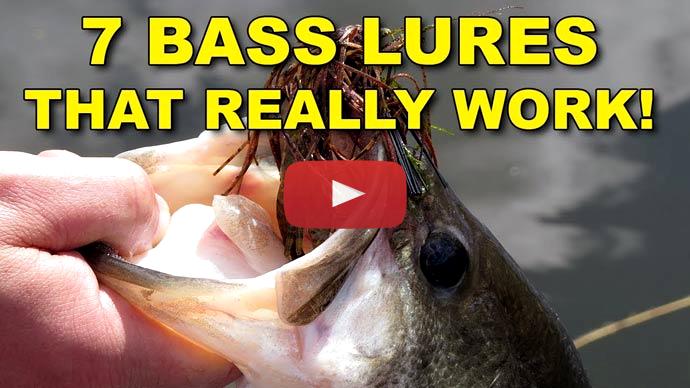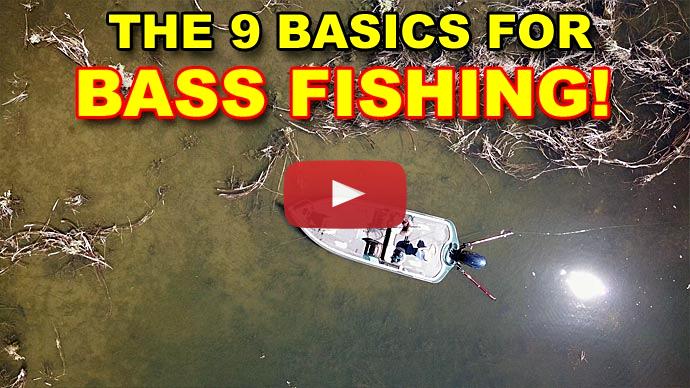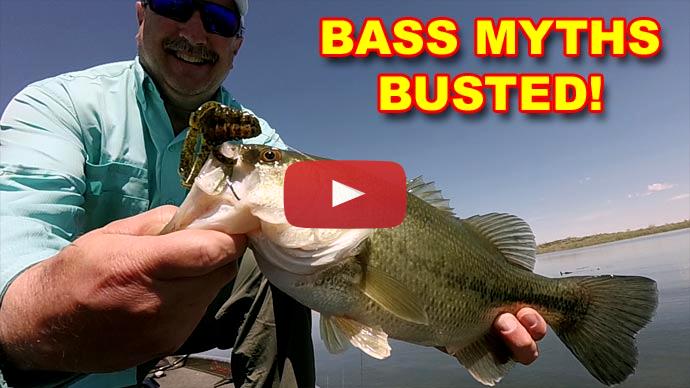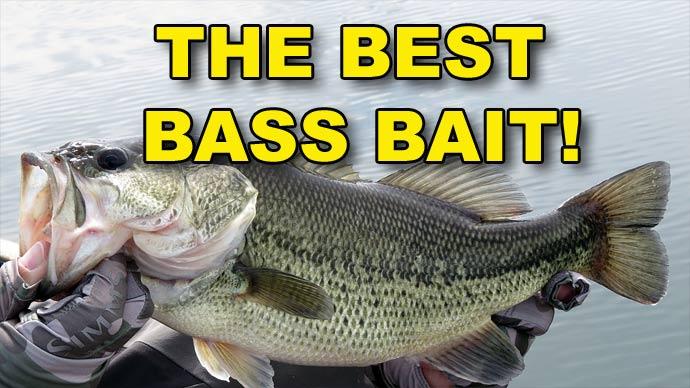Glenn: Hey, folks. Glenn May here with BassResource.com. And today I'm with Ott DeFoe here at the Bass Master Classic in Knoxville, Tennessee. I got a quick question for you. Actually, it's not my question, it's people that come to our site that are always asking for advice either on the forums or they're emailing us, questions on Instagram. Lot of people are new the sport and they ask, just basically, "What do I use to catch bass?" Like, it's kind of an open question. But how would you answer that question?
Ott: For me, you know, that's a very, very open question and you look at how diverse our whole country is and what works in different areas and what doesn't. But my favorite thing all around the country is probably a Crane Bait, it's something that I can use that I can fish fairly quickly, I can cover water with, and I can find fish that are typically fairly active. So you know, I'm gonna use some type of a Crane Bait, shallow runner in some places, deep runner in some places, a medium diver in others. But I love a Crane Bait and just the fact that I can throw it out and I reel it back in, and I throw it out and I reel it back in, and I throw it out and I reel it back in. That's what I like about a Crane Bait is that I'm able to cover water with it to fish new places. And more times than not, you can find a fish that will bite a Crane Bait.
Glenn: There's no specialty rigging or special way to retrieve it, it's just pretty simple.
Ott: That's right. Throw it out and bring it back. Yeah.
Glenn: I like that. That's great.
Gerald Swindle: I think one of the things you can always use to catch fish is a plastic worm. You can take a rubber worm, whether it's a Zoom Trick Worm or Zoom Finesse Worm, and rig it on a 12-pound line, a light sinker, and cast it to cover, with like a four aught small shank hook and, dude, you're gonna get bites. You know, you can't hardly go wrong if you're just learning to fish, tie on a plastic worm, Texas rig, and just ease around and cast at wood, cast at cover, you're gonna get bites.
Glenn: This is a universal rig for everything?
Gerald: It's a universal, just a plain old plastic Texas rig worm will get you bites.
Glenn: Don't over think it.
Gerald: Do not overthink it. Just cast, let it go to the bottom. Kind of use your imagination, picture yourself as the worm, letting it fall down in the cover, fish it, and the slower you fish it the better.
Kevin VanDam: Well, you know, there's so many different lures that you can use to catch bass. But one thing I can tell people, especially beginning fishermen, is bass in general are very cover or target oriented. They like to hang around, you know, structure like a, you know, tree, or dock, or clump of grass, or lily pads, or a stump, or something like that. So being able to make a really good accurate cast with a soft presentation is probably some of the best advice that I can give you to catch more of them. So if I can pitch my lure over to where a bass is sitting and not have them spook from the splash of it and land right target to them, you know, in front of them, a lot of times they'll react to it. So working on your casting accuracy is a great thing to do to catch more bass and it's something you can do. Like, if you live in Michigan like I do, when I was a kid, that's what I would do is sit in the living room or the basement and practice casting at little buckets or a paper plate or something like that just to make those good, accurate casts.
Glenn: Very simple question. What do I use to catch bass?
Brandon Palaniuk: Now, see, that's like one of the most broad questions you could ask in fishing. And I don't know that anyone has enough patience to sit here and listen to me explain all the answers that could go into that question.
Glenn: Let's do the cliff note version.
Brandon: So I would say, like, number one thing you can do is research on BassResource.com, right? There's ton of information that you can gather. So usually when people ask that question, they haven't done the research to find those answers. And to go when you start to do your research, I would try to narrow it down to the type of body of water that you're fishing. Is it a river, a highland reservoir, a natural lake? What are the current conditions? Is it muddy? Is it clear water? You know, try to narrow all of those things that Mother Nature can change, all those conditions and variables, and use that in your research to figure out what you should use to catch fish. Because all of those conditions are going to adjust what you throw. So I could go on and on about all those different variables because there's so many combinations, but really it's, like, the best thing to do is there's so much information out there is just to go and research the style of body of water. It doesn't have to be that exact body of water but just those similar conditions to allow you to figure out what's the best things to use at certain times until it just becomes second nature to you.
Glenn: It's kind of like when you're planning to go on vacation. You do your research first, kind of like what you want to do before you get there.
Brandon: Exactly. Exactly. It's like if you go to Subway and you're ordering a sandwich, you've done it enough times after a while that you know when you walk in there what you're gonna...you're gonna pull up to the line, you're gonna order this type of bread, you're gonna order this type of cheese and meat and so on and so forth.
Glenn: Turkey or chicken.
Brandon: Yeah. Turkey. Till you get to what you want at the end. But before, if you've never been there, you walk in, you don't really know what to do, you don't know what you'd like or combinations. And so, the more research you do, the more knowledge you have and you're able to use to figure that out. So that's my best advice without going into a super long conversation of every single bait you should use for every single condition.
Glenn: Makes sense. Thank you so much. I appreciate that.
Edwin Evers: I try to keep it simple. If you really think about it, it's gonna be a little long-winded question, but think about it. Bass eat three things. They eat shad, they eat blue gills, and they eat crawdads, okay? And when you go into a Bass Pro store and thousands and thousands of lures, and you're trying to pick out a lure, remember those three things, you know. A shad's gonna be a white or chartreuse colored type bait, you know. A crawdad's gonna be a brown or a dark-colored type bait. A bluegill's gonna be a chartreuse-colored type bait. And if you break it down a little bit more, you know, shad could be really the main diet summer to fall, crawdads could be the main diet winter to spring, you know, bluegills right there in the summer especially around the bluegill spawn. So it's not more about, you know, this particular bait that costs $22 or this one that costs $3. It's more about, "Hey, what do you think those bass are eating in the body of water you're going to?"
Now, maybe if my beginner fisherman that we're talking to here is fishing in a pond, take those three equations, take that shad equation out. Now you're just dealing with bluegills and crawdads. You might throw a frog in there because you got, you know, but 90% of all the bass, they eat those three things no matter where you're at, a river, a lake, a pond. So keep that in mind when you're choosing a lure. That's what they eat, you know. And I've always said that the wrong bait in the right place will catch them. So you know, a couple of baits that you've got confidence in, put them on, cover a lot of water, and eventually you're gonna run into them.
Keith Poche: Yeah. You know, I mean, we fish with a lot of different things. And at the end of the day, we have to go with what we feel confident in and what we feel like we excel at. You know, an angler has to figure that out. But to bring things to a simplified form, you know, you take just like a regular, like a soft plastic worm. I like The General, it's a Berkley product, it's a soft plastic stick bait. That bait has been catching fish for many, many years. It's easy to fish. You can fish it weightless with just a hook or you can put it on a shaky head, you can put it with a little small bullet weight, and just cast it around. That bait is a fish-catching machine. It's a small profile, it's a finesse-type technique, so anything to that effect, you know, just a straight worm. The Hit Worm is a great worm. You know, to start out just to catch fish, not getting into the hard baits yet, I think, is the real deal. Because the hard baits is a different level in my opinion. It took me a while to learn hard baits to really dial them in and know how to fish them and where to fish them. But plastics, you can throw them anywhere, they're weedless, they catch a ton of fish and...yeah. I mean, that's what I would suggest for a beginner to learn how to really get a confidence in how to catch fish and where to catch fish. But, you know, there's a ton of different baits, and you can spend all your baits. But fishing those, you know, small worms will get you a lot of bites and some big bites as well. And you know, at one of my recent events, I was throwing The General on a shaky head and I finished 12th at the Bass Pro Tour, and it was a great event. I caught pretty much 95% of my fish on that little old, you know, straight, do nothing worm. It's just a bait that's been catching fish for many years and it's proven to work, and I suggest that for anybody that's wanting to go out and have a good time and catch a lot of fish.
Chris Zaldain: Yeah. You know, I always say, man, you could get the job done, you know, whatever that job may be, catching a five-pounder, just a bite. Always something you could wind, like a spinner bait or a crank bait, and something you could fish real slow, like a jig or a worm. So with that kind of one-two punch and sticking around high percentage areas like main lake points, like secondary points, you can't go wrong. So pick you a nice half-ounce chartreuse and white spinnerbait. I like the Santone spinnerbaits, Santone jig, something you could work on the bottom. And you know, stick to those points. I think that's about as basic as you could get. There's always fish. I don't care if they're spawning, I don't care if it's the dead of winter, there are always fish on main lake points no matter what lake you're on.




